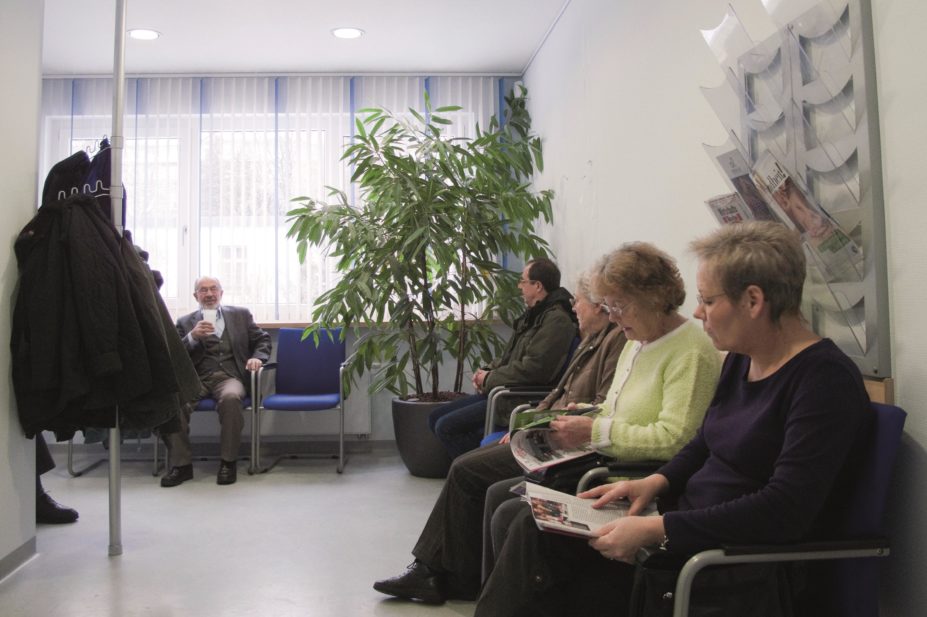
RayArt Graphics / Alamy
Pharmacists should be employed to work in stretched GP surgeries across England to improve pharmaceutical care and relieve pressure on GPs, according to a proposal from the Royal Pharmaceutical Society (RPS) and the Royal College of General Practitioners (RCGP).
A joint statement from the organisations, which will be announced at an event in London on 17 March 2015, calls for pharmacists to be offered clinical roles within GP practice teams, similar to how pharmacists work on hospital wards.
David Branford, chairman of the English Pharmacy Board of the RPS, told The Pharmaceutical Journal that thousands of pharmacists could work within GP practice teams. “Even if you only had half of [GP practices] having a pharmacist each, that’s 4,000 pharmacists. There’s every reason to imagine GP practices may want more than one pharmacist,” he says.
“We would anticipate and hope that this opens up a completely new career path for pharmacists in addition to the ones they’ve got already, which would have a significant effect on the manpower issue we have at the moment.”
The drive forms part of a new English Pharmacy Board campaign, which calls for greater collaboration between pharmacists and GPs, including community pharmacists working more closely with general practice.
Pressure on GP services
The joint statement comes as many GP practices are struggling with soaring demand for their services at a time of stagnant growth in the GP workforce. The RCGP says this has lengthened waiting times at surgeries.
In contrast, there is an oversupply of pharmacists, and the two organisations believe pharmacists could take on a portion of GPs’ caseloads to consult with patients on medicines issues, such as problems with prescriptions and prescribing errors.
This would free up GPs to focus on the diagnosis and treatment of more complex conditions, the organisations argue. Practice-based pharmacists would also liaise with other health professionals, such as those in community pharmacy, hospitals and care homes, to reduce medicines waste and improve value for money on drug expenditure. This may also include domiciliary care.
The RPS says pharmacists could be employed through a variety of means, including direct employment by a GP practice, a financial agreement with a local pharmacy to provide the pharmacists, by CCGs to work across several practices, or by agencies who supply staff to practices.
Branford says it is difficult to estimate exactly how many more pharmacists could work in GP surgeries as a result of the initiative and how soon they could be in place.
“At the moment we think that many GPs, particularly those who are really struggling to recruit, will see this as a tremendous opportunity,” he adds.
He says there is “no shortage” of evidence of pharmacists’ benefit to patient care, pointing to the RPS policy on the new campaign, which highlights two formal studies and seven case studies of sites where pharmacists are already working within general practice.
He dismissed the idea that community pharmacy contracts could be lost to general practice once they begin hiring pharmacists.
The skills and training that pharmacists will need to take on this role will depend on the circumstances within the hiring practice, Branford explains. The RPS is looking to develop training materials for the different functions in general practice and tie this into the RPS Faculty’s development programme.
‘Hidden army’
Maureen Baker, RCGP chairwoman, says the length of time needed to train GPs means the NHS must act now to address issues around workforce capacity in primary care. “Yet we already have a ‘hidden army’ of highly-trained pharmacists who could provide a solution,” she says. “Practice-based pharmacists, working as part of the clinical team, would relieve the pressure on GPs and make a huge difference to patient care.”
Baker says the proposals do not call for pharmacy premises in GP surgeries, but instead to make use of pharmacists’ patient-facing skills. “Patients with long-term conditions such as asthma or diabetes with complex medicine needs would particularly benefit from having a pharmacist to help them navigate the conflicting and confusing information they sometimes receive about their treatment as they move between hospital and community care,” she says.
“Practice teams can also benefit from a pharmacist’s advice to help avoid medicines waste, improve the management of medicines and rationalise costs at this time of a squeeze on NHS finances.”
The new English Pharmacy Board campaign calls for local commissioners to give pharmacists a greater role in local care pathways. It also asks NHS England to support “the spread of good practice and the dissemination of evidence that shows the benefits of pharmacist input in GP surgeries”.
The 2013
‘Now or Never’ report
by
the Commission on Future Models of Care, chaired independently by Judith Smith,
called for the profession to take on new “caregiving” roles to secure its future. This vision was
reiterated by the 2014 follow-up report, ‘Now More Than Ever’; both were commissioned by the RPS.
The previous English Pharmacy Board campaign, la
unched in October 2014, called for pharmacists to have a greater role in urgent and emergency care.
You may also be interested in
Long service of members

Membership fees 2022
